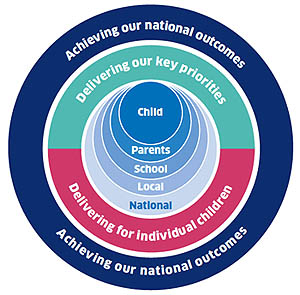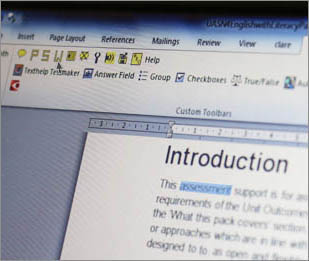 Newsletter: join thousands of other people
Newsletter: join thousands of other people
Once a month we'll send you an email with news, research and thoughts, as well as training courses and free webinars you may wish to attend.
Our websites:
Posted by Paul Nisbet on the 24th November, 2016

The vision for education in Scotland described in the National Improvement Framework is:

Professor Andy Hargreaves, a member of the International Council of Education Advisers that is advising the Scottish Government on the National Improvement Framework, has undertaken research on the impact of Assistive Technology. He writes that:
The use of assistive technology to support the needs of special education students has been a revelation and has begun a small revolution in student achievement, so that many students are now able to access, develop and display what they know in ways that have never been possible for them before.
Assistive technologies, the results of this study show, can increase participation, enhance inclusion, develop positive identity and self-confidence and raise achievement in the community of students with special educational needs. They can also enhance, extend and engage learning among all students.
Reference: Hargreaves, A. & Braun, H. (2012). Leading for all page 53.
However, Professor Hargreaves also notes that technology in itself is insufficient:
Assistive technology is not simply a device such as a laptop or a piece of software. Nor is it a single investment in time and resources. It is as an interconnected system that encompasses planning, professional development, personnel, and equipment.

There are many examples of good practice and provision of digital and Assistive Technology in Scotland - for example:
There is therefore considerable variation in access to and use of assistive technology across Scotland. In 2014 the Scottish Government and SQA organised a series of roundtable meetings in response to concerns over the policy regarding readers and scribes in national literacy assessment.
The final report notes that:
it was apparent that there is significant variability in access to technology between schools in the same area and between schools in different parts of Scotland.
Reference: Executive Summary Discussion Outcomes: Round table event relating to support for disabled learners in national literacy units, August 2014, Ashbrook Research & Consultancy Ltd.
CALL Scotland's vision is that:
Every child / young person in Scotland with a disability or additional support needs has the curriculum materials, the Assistive Technologies and/or Augmentative and Alternative Communication tools they may need - and the support to use them effectively.
Sounds simple? If we can achieve it, it's likely that Scottish education will benefit from the kind of improvements reported by Professor Hargreaves in Ontario.
The recently published Digital Learning and Teaching Strategy lists four objectives that (if they are achieved) should help:
- Develop the skills and confidence of teachers;
- Improve access to digital technology for all learners;
- Ensure that digital technology is a central consideration in all areas of curriculum and assessment delivery;
- Empower leaders of change to drive innovation and investment in digital technology for learning and teaching.
Education transforms lives. For some learners, Assistive Technology offers the only means through which they can access education and the curriculum and participate independently. Access to the curriculum is a right for all children in Scotland. Access to (digital) accessible curriculum materials is a reasonable adjustment under the Equality Act. Professor Hargreaves reminds us that Assistive Technology can raise attainment.
These are all powerful messages which I believe need to be communicated more strongly and more loudly. It is simply not good enough that some learners have access to life-changing learning tools, while others apparently do not.
We are often told that CALL Scotland 'punches above its weight', which is encouraging, and our latest Annual Report does indeed report some good news. But punching above our weight isn't sufficient: we and the other Assistive Technology specialists and users in schools and authorities across the country need to have greater weight to begin with.
As a community, let's take the opportunities offered by the National Improvement Framework and the Digital Learning and Teaching Strategy to argue our case and raise expectations about Assistive Technology. We need skilled Assistive Technologists in every part of Scotland so that appropriate tools can be identified for learners, and supported in school. We need budgets for equipment. We need technical and network providers to ensure that school devices are accessible. We need to raise awareness and expectations about accessible digital technology.
Onwards and upwards!

10-week short study online course

Once a month we'll send you an email with news, research and thoughts, as well as training courses and free webinars you may wish to attend.
Our social media sites - YouTube, Twitter and Facebook